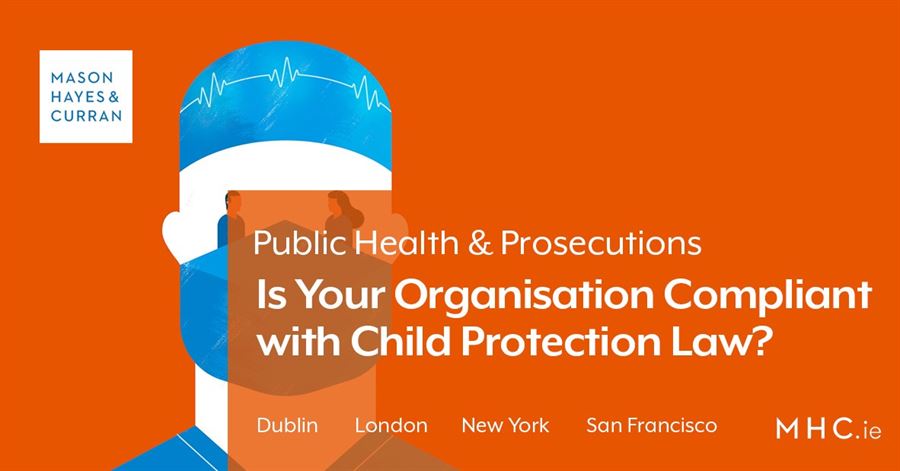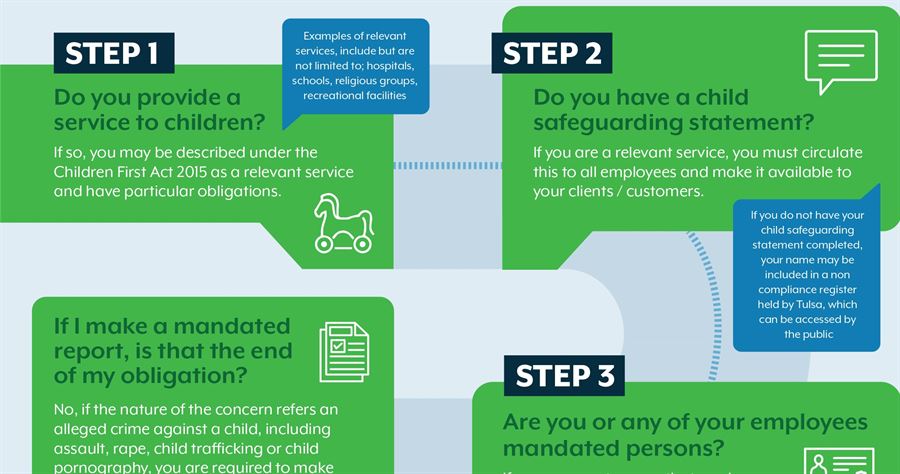Public Health & Prosecutions Update: Is Your Organisation Compliant with Child Protection Law?

In December 2017, the main provisions of the Children First Act 2015 commenced and marked a significant shift in child protection practice in Ireland. For the first time, many individuals and organisations have a statutory obligation to recognise and report child abuse to the appropriate state agency TUSLA.
Prior to this, the concept of interagency co-operation in child abuse was more of a recommendation than a legal requirement. Over the last two years, there has also been increased attention on related child protection legislation such as the National Vetting Bureau Act (children and vulnerable persons) 2012 and the Criminal Justice Act 2012 (withholding of information on offences against children and vulnerable persons).
As part of your review of child protection policies, it may be helpful to consider compliance within the following three categories:
Children First Act 2015
-
Do you provide a relevant service to children? This includes any work or activity which is carried out by a person, a necessary and regular part of which consists mainly of the person having access to, or contact with, children. A list of relevant services are available from TUSLA here
-
Have you completed a child safeguarding statement? If your organisation provides a relevant service, you must prepare a child safeguarding statement and circulate to all staff members. This should be done three months after the commencement of the legislation or within three months of setting up as new service. Tips on completing your statement are included here
-
What are the implications of non-compliance with the child safeguarding statement? Under Section 13 of the Children First Act 2015, TUSLA operates a register of non-compliance notices, which is available to the general public. A potential client / customer can now check this register, which is available here and discuss any issues with the compliance team on csscu@tusla.ie
-
Are any of your employees mandated persons? A wide range of specified professions and individuals such as social workers, teachers, doctors, dentists, counsellors and others are now mandated persons who have a legal obligation to report child protection concerns to the state authority, TUSLA. To ascertain if you are a mandated person or you employ mandated persons, review list included here
-
Do you or your employees know when to make a mandatory report? Many organisations report ongoing confusion on when a mandatory report is required. It is very important that your organisation has a clear policy on this. See here for more details If you are still not sure, you can contact your local TUSLA office for guidance.
The Criminal Justice Act 2012 - withholding of information on offences against children and vulnerable persons
-
If I make a report of child abuse to TUSLA, is that the end of my legal obligation? No - It is important to note that your obligations under the Children First Act are in addition to your obligation to report certain crimes against a child to the Gardaí. This includes but is not limited to, assault, sexual assault, child pornography and child trafficking. See here for more details.
-
Do you and your employees understand the implications for failure to report a crime against a child to Gardai? Implications of non-compliance of an organisation/ individuals are significant and may include fines and imprisonment.
National Vetting Act 2012 - children and vulnerable persons
-
Are you or any of your employees carrying out relevant work? This involves work or activity, a necessary and regular part which consists of having access to, or contact with, children in a school, crèche, hospital, residential care facility, counselling service, religious group, education setting. Click here to consider if your organisation is carrying out relevant work.
-
Have you applied for vetting? If you or your employees are carrying out relevant work, it is compulsory to apply to the National Vetting Bureau for vetting disclosure. Failure to comply with vetting requirements is a criminal offence and may lead to formal charges and penalties for individuals and organisations, including imprisonment and fines.
-
Have you made a finding relating to a professional / employee, which impacts their suitability to work with children and vulnerable adults in the future? If so, there may be a requirement to notify the vetting bureau of “specified information”, to be disclosed in the event the person applies for a job in the future. This could include, but is not limited to disciplinary proceedings and professional fitness to practice procedures. See further details here
 Ensuring compliance
Ensuring compliance
Our Child Protection Complaince Infographic helpfully outlines the steps that can be taken to ensure full compliance with the legislation.
Conclusion
Two years after significant changes to child protection legislation, it is a good time for your organisation to:
-
Ensure you have a child protection policy, which reflects your legal obligations under the three key frameworks, including advices to employee on sanctions for non-compliance
-
Check that you have provided adequate training for your mandated persons and other employees to recognise and report child abuse
-
Mitigate the risk posed by employees / volunteers to children who avail of your service by complying with vetting requirements
Going into 2020, you should action gaps identified in your child protection policy to ensure full compliance with the legislation, with particular reference to the dual responsibility for organisations to report serious concerns for children’s welfare to TUSLA and Gardai. Our lawyers are available to assist your organisation with this from policy development and child protection training to employment advices.
The content of this article is provided for information purposes only and does not constitute legal or other advice.
Share this:



